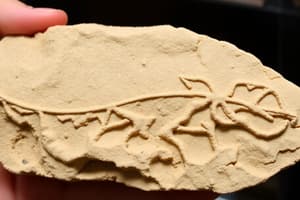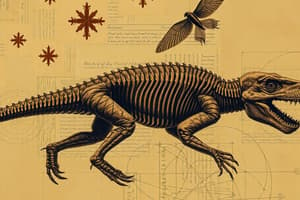Podcast
Questions and Answers
What type of fossil provides information about the behavior of an organism?
What type of fossil provides information about the behavior of an organism?
- Body fossils
- Trace fossils (correct)
- Gastroliths
- Coprolites
Which process is most effective in preserving articulated skeletons during fossilization?
Which process is most effective in preserving articulated skeletons during fossilization?
- Exposure to water over time
- Burial in dry, sandy environments
- Fast burial with minimal disturbance (correct)
- Slow and gradual burial
Which of the following fossils would indicate the dietary habits of herbivorous dinosaurs?
Which of the following fossils would indicate the dietary habits of herbivorous dinosaurs?
- Gastroliths (correct)
- Coprolites (correct)
- Bonebeds
- Footprints
What is the primary purpose of studying trace fossils in paleontology?
What is the primary purpose of studying trace fossils in paleontology?
Which characteristic is NOT typically associated with trace fossils?
Which characteristic is NOT typically associated with trace fossils?
What is the minimum age of fossils according to the content?
What is the minimum age of fossils according to the content?
Which type of rock is NOT suitable for fossil preservation?
Which type of rock is NOT suitable for fossil preservation?
What process involves the infilling of pore spaces in bones with minerals?
What process involves the infilling of pore spaces in bones with minerals?
What are body fossils primarily composed of?
What are body fossils primarily composed of?
Which of the following best describes fossils?
Which of the following best describes fossils?
From what Latin term does the word 'fossil' originate?
From what Latin term does the word 'fossil' originate?
What is the main reason we are able to learn about dinosaurs?
What is the main reason we are able to learn about dinosaurs?
What cannot be categorized as a fossil?
What cannot be categorized as a fossil?
What is the significance of Sinosauropteryx prima in paleontological studies?
What is the significance of Sinosauropteryx prima in paleontological studies?
Which of the following characteristics is associated with Psittacosaurus?
Which of the following characteristics is associated with Psittacosaurus?
What was the age of the remains of the wolf pup mummy mentioned?
What was the age of the remains of the wolf pup mummy mentioned?
Which dinosaur family does Psittacosaurus belong to?
Which dinosaur family does Psittacosaurus belong to?
What role do the gastroliths play in the anatomy of certain dinosaurs?
What role do the gastroliths play in the anatomy of certain dinosaurs?
Which type of rocks are primarily targeted when prospecting for fossils?
Which type of rocks are primarily targeted when prospecting for fossils?
What is the primary purpose of curation in fossil preparation?
What is the primary purpose of curation in fossil preparation?
What is one major step involved in creating a plaster jacket for fossil transport?
What is one major step involved in creating a plaster jacket for fossil transport?
Which activity is considered the most important part of conducting a fossil expedition?
Which activity is considered the most important part of conducting a fossil expedition?
In fossil research and education, how can the findings be shared with the public?
In fossil research and education, how can the findings be shared with the public?
What is a key characteristic of the dinosaurs that fossil collectors focus on?
What is a key characteristic of the dinosaurs that fossil collectors focus on?
What does sedimentology study in relation to fossils?
What does sedimentology study in relation to fossils?
What is one of the challenges often faced during the preparation of fossils?
What is one of the challenges often faced during the preparation of fossils?
What is the half-life of Potassium 40?
What is the half-life of Potassium 40?
Which process allows for determining the relative age of sedimentary rock layers?
Which process allows for determining the relative age of sedimentary rock layers?
Which principle states that younger layers of rock are deposited on top of older layers?
Which principle states that younger layers of rock are deposited on top of older layers?
What type of fossils are considered excellent index fossils?
What type of fossils are considered excellent index fossils?
Which of the following is a characteristic of the Principle of Original Horizontality?
Which of the following is a characteristic of the Principle of Original Horizontality?
What does the Principle of Cross-Cutting Relationships suggest about geological features?
What does the Principle of Cross-Cutting Relationships suggest about geological features?
Which dating method is considered excellent for dating the oldest rocks?
Which dating method is considered excellent for dating the oldest rocks?
Which of the following statements is true regarding relative dating?
Which of the following statements is true regarding relative dating?
What characterizes distinct intervals of time in biostratigraphy?
What characterizes distinct intervals of time in biostratigraphy?
What role does lithostratigraphy play in geological studies?
What role does lithostratigraphy play in geological studies?
How does erosion affect sedimentary rock layers?
How does erosion affect sedimentary rock layers?
Which of the following processes contributes to the natural accumulation of sediments?
Which of the following processes contributes to the natural accumulation of sediments?
What is the primary focus of geochronology?
What is the primary focus of geochronology?
How does relative dating compare to absolute dating?
How does relative dating compare to absolute dating?
Flashcards are hidden until you start studying
Study Notes
Fossils and Fossilization
- Fossils are preserved remains or traces of ancient organisms, over 10,000 years old, differing from human artifacts in archaeology.
- Fossils form due to rare preservation after death, as most organic remains are destroyed by decomposition or scavenging.
Fossilization Processes
- Replacement: Involves molecular replacement of hydroxyapatite (calcium-sodium) with fluorapatite.
- Permineralization: Occurs when minerals infiltrate pore spaces in bones, contributing to fossil integrity.
Fossil Locations
- Fossils are predominantly found in sedimentary rocks, which are formed from particles like sand, silt, and mud.
- Igneous and metamorphic rocks are unsuitable for fossil preservation due to their high heat and pressure conditions.
Types of Fossils
- Body Fossils: Includes hard tissues like bones and teeth, often undergoing replacement or permineralization. Soft tissues can also be preserved.
- Trace Fossils: Known as ichnofossils, they include footprints, burrows, and other behavioral imprints left by organisms.
- Other Fossil Types: Includes coprolites (fossilized feces) and gastroliths (stones ingested for digestion).
Fossilization of Body Fossils
- Fast burial typically preserves articulated skeletons, while slow burial often leads to disarticulation.
- Significant sites include the Dinosaur Provincial Park in Alberta, known for Centrosaurus bonebeds.
Trace Fossils and Behavioral Insights
- Trace fossils provide clues to animal behavior, locomotion, and social structures.
- Dinosaur footprints are the most common type of trace fossils.
Ancient Soft Tissue Preservation
- Soft tissues, such as blood vessels and skin impressions, can be preserved, providing insights into ancient life.
- Notable discoveries include dinosaur mummies and feathered dinosaurs like Sinosauropteryx prima.
Fossil Collection and Research
- Collecting fossils involves planning, prospecting, and careful extraction, often using plaster jackets to protect specimens during transport.
- Proper curation and preparation require extensive resources, aiming for educational and research purposes.
Sedimentology and Fossil Dating
- Geology: Focuses on Earth's physical structure and history, using methods like Potassium-Argon and Uranium-Lead dating.
- Relative dating techniques include lithostratigraphy (younger layers atop older) and biostratigraphy (using unique fossil assemblages).
Steno’s Laws of Stratigraphy
- Principle of Superposition: Younger layers of rock are deposited on top of older layers.
- Principle of Original Horizontality: Sediments are originally deposited flat.
- Principle of Lateral Continuity: Layers extend continuously across distances unless interrupted by erosion.
- Principle of Cross-Cutting Relationships: Geological features that cut through others are younger.
Biostratigraphy and Index Fossils
- Fossil assemblages help determine the ages of rock layers; index fossils, such as ammonites, pinpoint specific geological periods.
- A combination of numerical dating and relative dating methods constructs a complete geological timescale.
Geological Timescale
- The timescale illustrates the periods when non-avian dinosaurs lived, highlighting the Mesozoic Era.
Studying That Suits You
Use AI to generate personalized quizzes and flashcards to suit your learning preferences.




